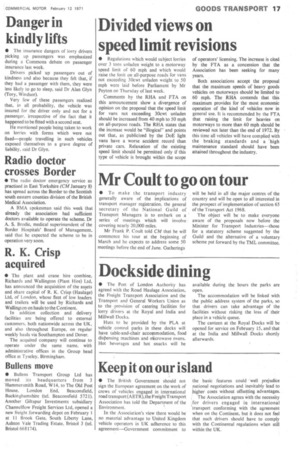Divided views on speed limit revisions
Page 19

If you've noticed an error in this article please click here to report it so we can fix it.
• Regulations which would subject lorries over 3 tons unladen weight to a motorway speed limit of 60 mph and which would raise the limit on all-purpose roads for vans not exceeding 30cwt unladen weight to 50 mph were laid before Parliament by Mr Peyton on Thursday of last week.
Comments by the RHA and FTA on this announcement show a divergence of opinion on the proposal that the speed limit for vans not exceeding 30ewt unladen should be increased from 40 mph to 50 mph on all-purpose roads. The RHA states that the increase would be "illogical" and points out that, as publicized by the DoE light vans have a worse accident record than private cars. Relaxation of the existing speed limit should be permitted only if this type of vehicle is brought within the scope of operators' licensing. The increase is cited by the FTA as a concession that the Association has been seeking for many years.
Both associations accept the proposal that the maximum speeds of heavy goods vehicles on motorways should be limited to 60 mph. The RHA contends that this maximum provides for the most economic operation of the kind of vehicles now in general use. It is recommended by the FTA that raising the limit for heavies on motorways to more than 60 mph should be reviewed not later than the end of 1972. By this time all vehicles will have complied with the braking standards and a 'high maintenance standard should have been attained throughout the industry.
































































































